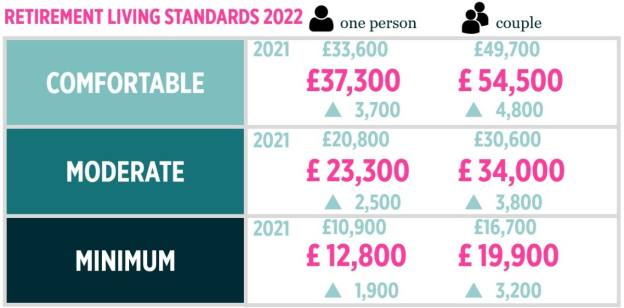

In its latest update published today (January 12), the PLSA found that people on the minimum lifestyle have seen the biggest percentage increase to the cost of their retirement.
This is owing to a higher proportion of their budget going towards the things that have risen the most in price: food and energy.

Source: PLSA
Tom Selby, head of retirement policy at AJ Bell, said it is a “sad fact” that people on the lowest incomes are, on average, facing the biggest challenge.
“That said, retirees are facing painful increases in living costs across the board, with the spending needed for a single person to enjoy ‘moderate’ and ‘comfortable’ living standards in retirement increasing by 12 per cent and 11 per cent, respectively,” he said.
“Soaring inflation places significant pressure on people’s pensions in two fundamental ways. For those saving for retirement, it means their target pension pot is bigger, meaning they might need to squirrel away a bit more each month in order to enjoy the retirement they want.”
The PLSA said the figures highlighted the need for pension reform to help more people achieve an adequate income in retirement.
Based on independent research by the Centre for Research in Social Policy at Loughborough University, the retirement living standards describe the cost of three different baskets of goods and services, established by what the public considers realistic and relevant expectations for retirement living.
These baskets comprise six categories: household bills, food and drink, transport, holidays and leisure, clothing and social and cultural participation.
Emma Douglas, director of workplace savings & retirement at Aviva and PLSA chair, said the amounts by which each income level has risen is a timely reminder of the importance of factoring the impact of inflation into retirement planning.
“Record-levels of inflation mean the cost of retiring, as well as the cost of living, is at an all-time high,” she said.
“Pension pots that might have sustained a target living standard in retirement might now fall short, meaning that today’s retirees might consider rethinking retirement plans.”
Douglas argued that the industry can help by providing modern pension solutions that are flexible enough to meet members’ changing needs.
This might include giving members the right to partial retirement and allowing members to take their benefits while remaining with their current employer.
Aviva is calling on government to put a ‘roadmap’ in place now for how and when it will extend auto-enrolment to include:
- A reduction in the age that people can begin saving through auto-enrolment from 22 to 18 years.
- Phased abolition of the £6,240 lower earnings limit to make it easier for lower income and part-time workers to save for their retirement.
“The current AE system disproportionately disadvantages the youngest workers, part-time workers, and those with multiple lower-paid or part-time jobs,” she added.
“Removing the lower earnings limit could have the biggest impact on closing the gender pension gap, because it would mean women in a pension scheme would get a contribution from the first pound they earn.
“The clock is ticking. The longer it takes for action, the less there will be in the pension pots of lowers earners, people with multiple jobs and part-time workers – and particularly part-time working women.”
A DWP spokesperson said: “Our ambition for the future of automatic enrolment will enable people to save more and to start saving earlier.
“However, we also recognise current concerns with rising prices and are committed to ensuring people have the support and information they need to make informed choices about their financial futures, with free and impartial guidance available via Pension Wise and Money Helper.”
Changes to the living standards required pot sizes
The retirement living standards are regularly reviewed to ensure they keep up with changes in the public’s expectations of what retired households need as well as the changes to prices on the shelves to remain relevant to real world retirement spending.
The cost of a minimum lifestyle increased from £10,900 to £12,800 – or 18 per cent – for a single person and from £16,700 to £19,900 – or 19 per cent – for a couple.
It includes £96 for a couple’s weekly food shop, a week’s holiday in the UK, eating out about once a month and some affordable leisure activities about twice a week.

Source: PLSA
PLSA said rising food and fuel prices contributed significantly to the increase in the minimum standard.
The update also saw the amount of food included within the budget increasing to bring it into line with the up-to-date nutritional research on a healthy diet.

Source: PLSA
PLSA said the disproportionate increase in the cost of retirement for those on the minimum retirement living standard means the government’s commitment to the state pension triple lock, announced in the most recent Autumn Statement, is especially important.
Rising by a record 10.1 per cent to £10,600 per year, a couple who are each in receipt of a full new state pension would reach the minimum retirement living standards.
This level should also be very achievable for a single person if they supplement the state pension with income from a workplace pension saved through automatic enrolment during their working life.
Nigel Peaple, director policy & advocacy at the PLSA, said the past year has been an enormously challenging one for many households in the UK.
“Inflation has risen to its highest rate in 40 years with the cost of essentials and domestic fuel soaring, putting substantial pressure on incomes for working age and retired households, particularly for those on low incomes,” he said.
“These figures underline why the government was right to increase the state pension in line with the triple lock in the Autumn Statement.”
sonia.rach@ft.com
What do you think about the issues raised by this story? Email us on FTAletters@ft.com to let us know



